Man in Profile: Joseph Mitchell of The New Yorker
Columbia School of Journalism Dean Coll Moderates Conversation with Authors Gay Talese & Thomas Kunkel
January 18, 2016 / Upper West Side Neighborhood / Manhattan History / News Analysis & Opinion / Gotham Buzz.
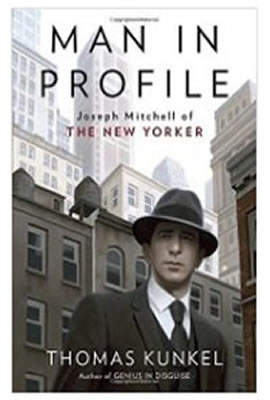 I received an invitation to attend a conversation at the Columbia School of Journalism about a new book covering the professional life of one of the most prominent writers of The New Yorker magazine. The Columbia University School of Journalism is easily one of the most prestigious journalism schools in the nation; and Columbia also hosts the judging for the Pulitzer Prize, which is considered one of the highest awards a journalist or author can receive.
I received an invitation to attend a conversation at the Columbia School of Journalism about a new book covering the professional life of one of the most prominent writers of The New Yorker magazine. The Columbia University School of Journalism is easily one of the most prestigious journalism schools in the nation; and Columbia also hosts the judging for the Pulitzer Prize, which is considered one of the highest awards a journalist or author can receive.
It was a fairly warm October evening as I made my way north on the subway along the Upper West Side. I got off at 116th Street and walked east through the main campus to the Faculty House. The Faculty House sits atop the Morningside Heights ridge overlooking Harlem, the Upper West Side and the rest of Manhattan.
The entrance into the Faculty House was from an interior courtyard where Columbia University students were hanging around in casual conversations. Once inside, I was directed to an upper floor where the event was being held.
Seated at the head of the room was Gay Talese, a Pulitzer Prize winner and author of numerous books including The Kingdom & The Power. He was in the company of the Dean of the Columbia School of Journalism, Steve Coll, who is also a Pulitzer Prize-winning author having penned several tomes about issues in Asia, most notably the Middle East. And of course, there was the guest author of the evening, Thomas Kunkel, who is the President of St. Norbert College in Wisconsin and who had penned the book being discussed this evening entitled Man in Profile: Joseph Mitchell of The New Yorker.
Click here to read the rest of our report regarding a conversation about the recently published book Man in Profile: Joseph Mitchell of The New Yorker at the Columbia School of Journalism.
Man in Profile: Joseph Mitchell of The New Yorker
Columbia School of Journalism Dean Coll Hosts Discussion with Authors Gay Talese & Thomas Kunkel
January 18, 2016 / Upper West Side Neighborhood / Manhattan History / News Analysis & Opinion / Gotham Buzz. Continued.
Thomas Kunkel Author of Three Books About The New Yorker
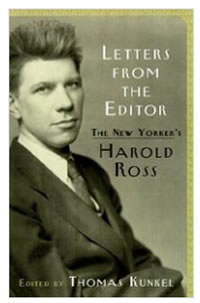 I had met Thomas Kunkel through his prior book – Harold Ross: Genius in Disguise – a copy of which he had given my father which I found lying on Dad's coffee table on a visit home. My father and Thomas Kunkel had met each other at St. Norbert College in Wisconsin where my father was a faculty member and Kunkel was President. Both men were former newspapermen, and shared an interest in the profession. My father's newspaper struggle against Gannett had been documented in the book entitled Chain Gang by Richard McCord. And at the time, Kunkel was the author of two books about Harold Ross, founding Editor-in-Chief of The New Yorker magazine.
I had met Thomas Kunkel through his prior book – Harold Ross: Genius in Disguise – a copy of which he had given my father which I found lying on Dad's coffee table on a visit home. My father and Thomas Kunkel had met each other at St. Norbert College in Wisconsin where my father was a faculty member and Kunkel was President. Both men were former newspapermen, and shared an interest in the profession. My father's newspaper struggle against Gannett had been documented in the book entitled Chain Gang by Richard McCord. And at the time, Kunkel was the author of two books about Harold Ross, founding Editor-in-Chief of The New Yorker magazine.
The discussion of Kunkel’s book about Joseph Mitchell, was underway as I took my place in the back of the room. Joseph Mitchell was a prominent writer for The New Yorker magazine during its Harold Ross heydays in the 1930’s, 1940’s and 1950’s. Mitchell held a position there until his death in 1996. The New Yorker – with writers like Mitchell - covered and brought to life people, subjects and situations that provided a fresh perspective on the world as we knew it.
Man in Profile: Joseph Mitchell of the New Yorker
Kunkel tells us Mitchell spent his time gathering fresh material with what one might call both the regular and irregular New Yorkers. Mitchell's writings cover a mix of people and a cast of characters that he had met frequenting places like McSorely’s Pub in the East Village, and on 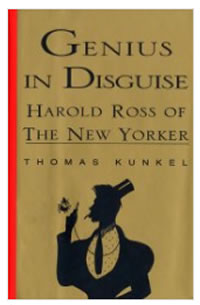 the docks of New York City’s seaport - prior to when ocean liners were eclipsed by international air travel. Mitchell started in journalism as a beat reporter and eventually graduated to penning literary journalistic pieces, which are interpretive stories laden with facts.
the docks of New York City’s seaport - prior to when ocean liners were eclipsed by international air travel. Mitchell started in journalism as a beat reporter and eventually graduated to penning literary journalistic pieces, which are interpretive stories laden with facts.
Kunkel in Conversation with Pulitzer Prize Winning Author Gay Talese
My interest in the attending this event grew when I learned that Gay Talese, author of The Kingdom and the Power, would also be speaking at the forum. The Kingdom and the Power is a book my Father had mentioned on numerous occasions over the course of his lifetime, because it’s about the power and attendant responsibilities of newspaper publishers, and specifically the New York Times.
According to Random House, publisher of The Kingdom and the Power, Talese's book is,
“… regarded as a classic piece of journalism … is as gripping as a work of fiction and as relevant as today's headlines.”
Gay Talese, Journalist & Writer, Explores the Boundaries of Storytelling
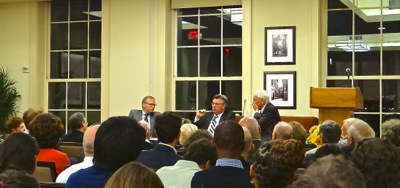 I started reading up on Gay Talese’s work, during which time a discussion about the boundaries separating journalism and fiction came to the fore. This is a subject that’s become of increasing interest to me as I write narrative pieces for a couple of web magazines in metropolitan New York City. And while I don’t aspire to fiction at this time, I periodically find a straight recitation of the facts too limiting to capture the real interest and essence of a story.
I started reading up on Gay Talese’s work, during which time a discussion about the boundaries separating journalism and fiction came to the fore. This is a subject that’s become of increasing interest to me as I write narrative pieces for a couple of web magazines in metropolitan New York City. And while I don’t aspire to fiction at this time, I periodically find a straight recitation of the facts too limiting to capture the real interest and essence of a story.
This subject is not new to the journalism profession, as facts can be reported in an interesting fashion by getting creative with how they’re presented - which can be done without fictionalizing them. It appears that both Talese and Kunkel have succeeded at this, as is evident by their books, as both authors draw their readers into real life stories in a fashion that gives the reader the feel of reading a novel.
Columbia University School of Journalism - Journalists' Issues
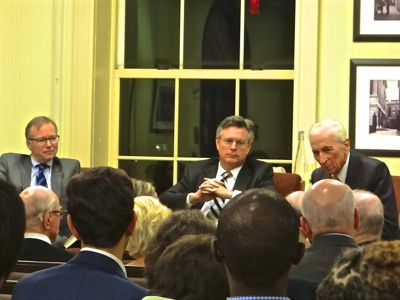 This issue – fact versus fiction – is what came to the fore in the conversation about Kunkel’s book – Man in Profile: Joseph Mitchell of the New Yorker.
This issue – fact versus fiction – is what came to the fore in the conversation about Kunkel’s book – Man in Profile: Joseph Mitchell of the New Yorker.
As I tuned in, the speakers were talking about how to present context in impactful ways. Thomas Kunkel remarked that in fiction this is done by shortening timelines, building composite people [characters exhibiting the qualities or traits of several real life people] and by including interpretations about what folks are thinking. The question to be answered is whether literary journalism can draw from this body of techniques, without tampering with the truth.
Gay Talese remarked that tape recorders capture the facts, but not in interesting ways. A verbatim is not as good as an authored comment because people don’t speak in literary sentences. He recalled doing an interview with Floyd Patterson who, he told us, talked in long run on sentences.
Talese spent three days interviewing Patterson and came away with the copy he was looking for through an ongoing dialogue. Talese opined that in some measure journalists collaborate with their subjects in order to tell interesting stories. He remarked that many authors today resort to a question and answer format, which he opined, is like reading a court report. He finished by telling us he didn’t like tape recorders.
Columbia University Center for Oral History - A Large Repository of Source Material
 Kunkel went on to talk about the source material he used, which included hours of interviews with Joseph Mitchell by University of Massachusetts at Amherst Professor Norman Simms. Kunkel found these interviews at the Columbia Center for Oral History, which contains over 20,000 hours of recordings and over 8,000 interviews covering American culture. The center opened in 1948 under the name of Oral History Research Office and its name was changed in 2011.
Kunkel went on to talk about the source material he used, which included hours of interviews with Joseph Mitchell by University of Massachusetts at Amherst Professor Norman Simms. Kunkel found these interviews at the Columbia Center for Oral History, which contains over 20,000 hours of recordings and over 8,000 interviews covering American culture. The center opened in 1948 under the name of Oral History Research Office and its name was changed in 2011.
Thomas Kunkel as Author(ity) on The New Yorker
Thomas Kunkel is as thorough a researcher as he is a lucid writer. It’s somewhere between possible and likely that Thomas Kunkel is one of the most pre-eminent living authorities on life at The New Yorker magazine from its inception through the mid 20th century. All of the books he's written on the subject demonstrate the pains he has taken to collect, organize and make sense of source material.
Kunkel told us that the reason Mitchell’s work endures is because it captures some of the universalities of human nature. He told us that in Mitchell's story entitled Mr. Hunter’s Grave, the long loopy sentences contain undercurrents of the state of the human condition. Kunkel went on to tell us that he had met Joseph Mitchell while doing research for his previous book, Harold Ross: Genius in Disguise and that it seemed that Mr. Mitchell was someone that “he needed to know”.
Gay Talese: Journalists as Creative Authors
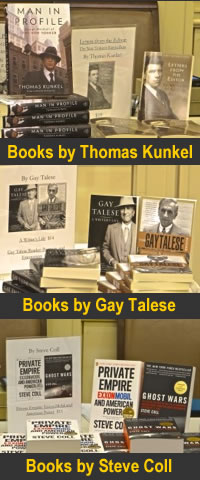 Gay Talese talked about the prose Mitchell used in the story entitled Thirty-Two Rats From Casablanca [1944]. Talese said that the sentences in this particular story are short and driving with momentum, while its peculiar facts were so curiously stated. He noted that Mitchell had an eye for detail and a literary vision with imagination.
Gay Talese talked about the prose Mitchell used in the story entitled Thirty-Two Rats From Casablanca [1944]. Talese said that the sentences in this particular story are short and driving with momentum, while its peculiar facts were so curiously stated. He noted that Mitchell had an eye for detail and a literary vision with imagination.
Columbia University School of Journalism: Questions & Answers
It was at this point that the forum was opened to the audience for questions.
Columbia Center for Oral History: 20th & 21st Century Source Material
Ronald J. Grele, Director Emeritus of the Columbia Center for Oral History, opined that tape recordings are a reference and thus provide a reliable source of information, while narrations depend on the trustworthiness of the narrator. He said that he never became a writer because he couldn’t talk and think metaphorically, and that the facts oftentimes destroy stories in order to provide a factual history. He concluded by informing us that some 2,000 published works had relied on the Columbia Center for Oral History to obtain source material, including the book being discussed in this conversation.
Were Joe Gould & Joseph Mitchell Inspiration for the Oral History Research Office?
Kunkel noted that one of Joseph Mitchell’s most famous works is entitled Joe Gould’s Secret. Joe Gould was a real person, a Harvard graduate in Anthropology, who lost his job as a writer. Joe Gould (d)evolved into a Bohemian New Yorker who lived on the streets, conversing and in some measure living off shopkeepers and barkeepers, while he collected information for what he would tell people was the longest book ever written or - An Oral History of Our Time.
Mitchell’s story in the 1942 New Yorker begins with this in the first paragraph,
"Profile of Joseph Ferdinand Gould, Harvard graduate, hobo panhandler and writer of "An Oral History of Our Time". … "There's nothing accidental about me," he [Joseph Gould] once said. "I'll tell you what it took to make me what I am today. It took old Yankee blood, an overwhelming aversion to possessions, four years of Harvard and 25 years of beating the living hell out of my insides with bad hooch and bad food. I'm out of joint with the rest of the world.”
This story was published on December 12, 1942 - less than a week after Pearl Harbor had been bombed by the Japanese, and the United States entered WWII. Three years after the war, the University of Columbia opened up the Oral History Research Office. I supposed one might fairly ask whether Joe Gould and Joseph Mitchell might have been, in part, their inspiration.
Subject & Author: Did Joe Gould's Secret Become Joseph Mitchell's Secret?
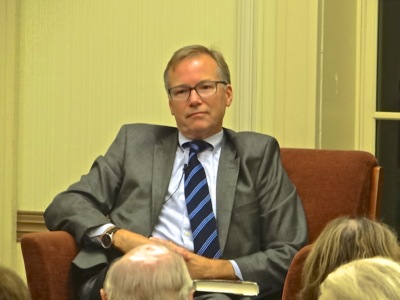 Kunkel talks about how Joe Gould was the subject of a follow on story, and eventually a book, by Joseph Mitchell. In the book Mitchell stated that he didn’t believe that Gould had written ‘the longest book ever written’ and that this was a fabrication. The irony is that for somewhere near the last thirty years of his life, Joseph Mitchell is reported to not have written much of anything either, even though he said he was, and he went to work at the New Yorker every day.
Kunkel talks about how Joe Gould was the subject of a follow on story, and eventually a book, by Joseph Mitchell. In the book Mitchell stated that he didn’t believe that Gould had written ‘the longest book ever written’ and that this was a fabrication. The irony is that for somewhere near the last thirty years of his life, Joseph Mitchell is reported to not have written much of anything either, even though he said he was, and he went to work at the New Yorker every day.
Mitchell reportedly spent his time cloistered in his office, door closed, with notebook, pen and typewriter. Near the end of his life Mitchell told someone that he’d written things in his mind and that there was an irony about how he had turned out to be a bit like the Joe Gould he’d written about. Joe Gould died in 1957 to very little fanfare.
Journalism as Archeology: Unearthing Truth & Issues
There are revelations in Kunkel’s book upon which others remarked. For instance that characters in one or more of Joseph Mitchell’s Profiles – like King of the Gypsies - had turned out to be composite characters [meaning the characteristics of several people rolled up into one person] and hence fictitious fabrications. And he notes that Editor-in-Chief Harold Ross would have known.
Someone asked the speakers whether they thought James Joyce used his imagination in writing Ulysses. Ulysses is considered by many to be one of the greatest non-fiction literary works of the 20th century. Ulysses was published in 1922 as governments tried to censor it for its attempt to publicly depict a fuller view of life, through the inclusion of private obscenities, masturbations and other behaviors flouting the conventions of the time.
Public & Private Sensibilities: Reporters, Trust & New Media
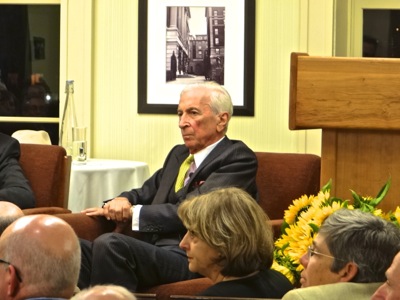 Talese seemed a bit wistful in responding to the question of whether he thought that any of the people like those covered in Mitchell’s Profiles, existed today. He said that publishers and subjects just don’t spend the time to get such stories, as they require developing a trust between subject and author. Someone mentioned something about how people today seem to open up publicly with very private matters on some of the blogs and social media like Facebook.
Talese seemed a bit wistful in responding to the question of whether he thought that any of the people like those covered in Mitchell’s Profiles, existed today. He said that publishers and subjects just don’t spend the time to get such stories, as they require developing a trust between subject and author. Someone mentioned something about how people today seem to open up publicly with very private matters on some of the blogs and social media like Facebook.
Talese returned to the story he did on Floyd Patterson upon which he spent days. During the breaks in the interview, Talese said he would imagine what it would have felt like to get knocked out.
Talese talked about one of his most famous stories, Frank Sinatra Has a Cold [Esquire 1965]. He told us that it took about a week to get the story because Frank Sinatra was feigning a cold. Sinatra didn’t want to be interviewed by any reporter, because he didn’t trust them.
Esquire kept pushing Talese to complete the story, but Talese couldn’t get near Sinatra, because Sinatra’s publicist kept telling Talese that ‘Frank Sinatra had a cold’. Talese stayed and did the story by observing Sinatra from a distance, since he had seen Sinatra moving around just fine and without the cold. Over the course of the week Talese worked on the story, it seems Sinatra came to trust him, and the story went on to include comments later obtained by Talese from Sinatra’s family, which Talese opined that Frank Sinatra surely knew about, and must have approved.
Journalism in the 21st Century: Thoughts on a Changing Environment
 Time was running out and the formal part of the forum was over. The Faculty House served hors d’oeuvres and wine, while the audience had an opportunity to meet the speakers, purchase books and have them signed by the authors.
Time was running out and the formal part of the forum was over. The Faculty House served hors d’oeuvres and wine, while the audience had an opportunity to meet the speakers, purchase books and have them signed by the authors.
Since attending that event I’ve given some thought to Thomas Kunkel’s book and the conversation hosted at the Faculty House by the Columbia University School of Journalism. There’s been a sort of disaggregation of the media over the past couple decades, as the search engines slice and dice content creators’ works, and subsequently serve them up in bits and bytes to the entire world.
Over the past decade the print publishing business, as defined mostly by newspapers and magazines, has lost about $25 billion in revenue. Coincidentally the largest search engine in the world has grown revenue by about the same figure. Content creators are being disaggregated from their revenue sources, while audiences are being distanced from the original information sources and the full context of the works.
Trusted Information Sources: The Ubiquity of Fact & Fiction on the Internet
 The benefit, of course, is that today anyone can publish anything and make it available to the world. The downside is that published pieces may be shabbily researched and written, or that opinions and fabrications may be presented as facts. Over the past decade or so I’ve witnessed many undisciplined authors and readers re-publish and reiterate factually incorrect information they picked up on the internet, and they parroted the web publisher as if they were recounting a truth from god.
The benefit, of course, is that today anyone can publish anything and make it available to the world. The downside is that published pieces may be shabbily researched and written, or that opinions and fabrications may be presented as facts. Over the past decade or so I’ve witnessed many undisciplined authors and readers re-publish and reiterate factually incorrect information they picked up on the internet, and they parroted the web publisher as if they were recounting a truth from god.
Given the advances in technologies, and the attendant lag in people learning how to manage them, I expect the debate of fact versus fiction in story telling to continue. The proliferation of easily-available, infinite information makes knowing the integrity of an information source even more challenging. Audiences are increasingly obtaining their information from filtered sources such as search engines and second [3rd, 4th, 5th ...] sourced and crowd-sourced social media.
Even news reporters and news organizations are becoming disaggregated from observing or researching events first hand. It’s not uncommon to see one report, one poll, one perspective on an event become the defacto standard / truth for that event, because the report of it is so mercilessly multiplied by resource-starved media organizations which increasingly rely upon others work for first person accounts. This ubiquitous, present-day, media 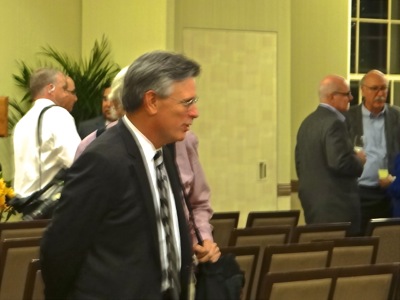 multiplier effect brings to mind Andy Warhol’s depiction of the mass marketing of images / impressions to the consuming audience.
multiplier effect brings to mind Andy Warhol’s depiction of the mass marketing of images / impressions to the consuming audience.
The State of Journalism: Where are we Going?
Our information is no longer gathered, written, reviewed and edited by a well-paid, elite intelligentsia - but rather developed and disseminated by the mass of humanity that uses the web.
And our information is organized, filtered and prioritized by machines - the software programs built by engineers working at the search engine and social media companies.
And thus the viewer – the audience – is left to prioritize, edit, source-verify and fact-check the information they consume on their own.
New Media: Freedom or Chaos?
Is this freedom or is this chaos? I reckon that like all great changes, perhaps it is a bit of both.
Many Thanks to the Columbia School of Journalism, Steve Coll, Thomas Kunkel & Gay Talese
 Congratulations to Author Thomas Kunkel on another fine book. And thanks and appreciation to Thomas Kunkel, Gay Talese and Steve Coll for an informative conversation.
Congratulations to Author Thomas Kunkel on another fine book. And thanks and appreciation to Thomas Kunkel, Gay Talese and Steve Coll for an informative conversation.
Addendum: The Faculty House Lunches & Space Rentals
I met Alice Newton, Deputy Director of Seminars, who gave me a quick tour of the Columbia University Faculty House, which is open for lunch daily, Monday through Friday, from 12 noon to 2 pm. They also rent the space for private events and the Faculty House has a beautiful view of the Upper West Side, Harlem and other parts of Manhattan.
By Michael Wood
Gotham Buzz Voluntary Subscriptions
We work very hard to help keep you informed by providing you with independent news coverage, as well as  information about events in the arts, culture and business in the borough.
information about events in the arts, culture and business in the borough.
You can help us continue to provide you with independent, first-person, fact-based, contextural reporting by purchasing an annual subscription. As it's voluntary, there are a variety of price options, one of which should fit within your budget.
Thanks for your encouragement & support.
NYC Boroughs - New York City
NYC Neighborhoods - New York City Related Info
Click this link for promotions, discounts and coupons in New York City.
Click these links for promotions by advertisers in Manhattan.
Click this link to go to the NYC Neighborhoods section.
Site Search Tips. 1) For best results, when typing in more than one word, use quotation marks - eg "Midtown Neighborhood". 2) Also try either singular or plural words when searching for a specific item such as "gym" or "gyms".
$element(bwcore,insert_search,N)$
Click this link to the Gotham Buzz front page.
$element(adman,groupads,Sectional2 Ad)$
Click the log in link below to create an ID and post an opinion.
Or send this story to a friend by filling in the appropriate box below.
NYC Related Links
Click for NYC Restaurants NYC.
Click for NYC Shopping NYC.
Click for Things To Do NYC - Holidays in NYC.
Click for NYC Neighborhoods NYC.














